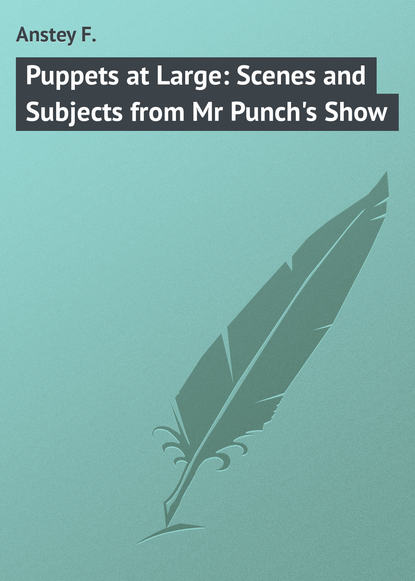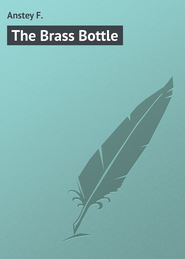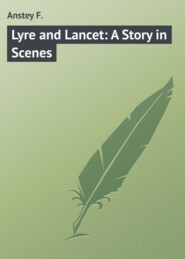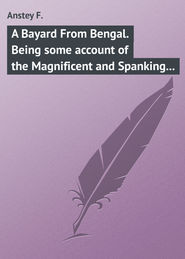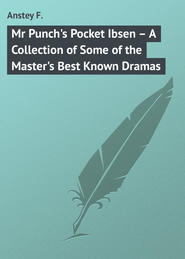По всем вопросам обращайтесь на: info@litportal.ru
(©) 2003-2024.
✖
Puppets at Large: Scenes and Subjects from Mr Punch's Show
Настройки чтения
Размер шрифта
Высота строк
Поля
THE MODEL DEMOCRACY
"I think you left directions that you were to be thawed in 199 – precisely?" said the stranger politely. "Allow me to introduce myself – Number Seven Million and Six. If you feel equal to the effort, and would care to see the vast improvements in our social condition since the close of the benighted Nineteenth Century, I shall be pleased to conduct you."
Mr. Punch then began to realise that he had had himself frozen by a patent process just a hundred years ago, and that he had returned to animation in time for the close of the marvellous Twentieth Century; so he prepared, in much curiosity and excitement, to accompany his guide.
"By the way," observed the latter, "you must not be annoyed if your – hem – habiliments, which we are unaccustomed to nowadays, should attract some attention."
Singularly enough, Mr. Punch had just begun to feel a certain embarrassment at the prospect of being seen in Piccadilly or Regent Street in the company of a person attired in grey cellular pyjamas, a drab blanket, and a glazed pot hat. However, on reaching the street, he found that every man he met was similarly clad, while his own costume – which, in his original century, would only have been remarkable for its unimpeachable taste – was, in this, the subject of universal and invidious comment.
"You'll have your regulation pot hat and pyjamas served out to you in time!" said Mr. Seven Million and Six encouragingly. "Then no one will say anything to you. In these days we resent anything that tends to confer an artificial distinction on any man. Surnames, for example, which occasionally suggested superiority of birth, have long been abolished, and official numbers substituted. You seem to be looking for something you do not see?" he added, noting a certain blankness and disappointment in Mr. Punch's expressive countenance.
"I was only wondering why I saw no signs of any new and marvellous inventions at present," said Mr. Punch. "I rather expected to see the air full of electric trains, manageable balloons, or coveys of citizens darting about on mechanical pinions. But I see none, and even more people go on foot than in my own time."
"Inventions, I take it," was the reply, "only served to enrich the Capitalist, and save time or labour. Now we have no Capitalists and no riches, and no reason for hurrying anywhere, while it would be absurd and useless to lessen the amount of manual labour when, even as it is, there is scarcely enough to keep everyone employed for six hours a day."
"Why are all the women I see dressed exactly alike in navy-blue woollen frocks and coal-scuttle bonnets?" Mr. Punch inquired presently. "Surely they can't all be members of the Sal – "
"A uniform costume was decreed by plebiscite some years ago," replied his mentor, promptly. "Any real equality amongst women was found hopeless so long as some were able to render themselves exceptionally attractive by a distinctive toilette."
"What!" exclaimed Mr. Punch, "did all the pretty women consent to such a sacrifice?"
"They were in a very decided minority, even then," said Mr. Seven Million and Six; "and it is not our way to think much of minorities. At present, owing no doubt to an enactment which penalised every pretty woman by compelling her to wear blue goggles and a respirator, feminine beauty is practically extinct."
Mr. Punch could not restrain a sigh. They were now entering a somewhat gloomy thoroughfare, between massive blocks of buildings, with large doors and innumerable small windows, which towered into the sky on either hand.
"I seem to miss the shop-fronts," he said aloud, "with their plate-glass, and all their glitter and luxury. What has become of them all?"
"Such necessaries as the citizen requires," said his companion, "are procured at the Public Storehouses, which you see around you, by the simple method of presenting a ticket. The luxuries you refer to were only procurable by the rich, and nobody is rich now. If you will come with me, I will take you over one of the State Dwelling-houses, and show you one of the suites of rooms. Every citizen has a room; or, if married, a couple of rooms, exactly the same shape and size as those of his fellows… Beautifully clean, you see!" he remarked, complacently, as he threw open one of the doors. "Neat whitewashed walls, plain deal furniture, nice holland blinds – what more can any reasonable citizen want in the way of comfort?"
"There used to be a celebrated poet in my time," said Mr. Punch, with some hesitation, "who designed and sold very beautiful upholstery – tapestry, wall-papers, curtains, and so on. I fancy he held Socialistic views. But I see no trace of his work here."
"I think I know whom you refer to," was the reply. "The community would doubtless have been glad of his Company's services if they would only have contracted to supply every citizen with precisely the same pattern and quality of their manufactures at, say, a pork-pie a yard. But, for some reason, the firm could not see their way to it, and the industry declined; which is not to be regretted, for it certainly tended to foster individualism."
"It is curious," said Mr. Punch, when they were outside again, "that I have not as yet seen a single policeman."
"Not at all curious. We have none. Crime simply proceeded from the galling sense of social inequality. Consequently, as soon as that was removed, Justice, with all its machinery, became an anachronism."
"I think," said Mr. Punch, presently, "I should like to take a stroll in Hyde Park."
"That," said his guide, "has not been possible for at least fifty years. All the parks are now cut up into three-acre allotments, where every able-bodied citizen does an hour's compulsory spade-work once a fortnight. A most admirable reform, as you will agree!"
"Capital!" gasped Mr. Punch, with an anticipatory pain in his back. "Then I am curious to see what strides have been made by your modern painters. Could you take me to a picture-gallery?"
"There are no modern painters. It is perhaps a pity – but quite unavoidable. It was an obvious injustice that, when all citizens had to perform their share of more or less distasteful manual labour, there should be any one class that earned a living by work in which they took a positive pleasure. So that every artist had to do his six hours' stone-breaking or brick-making; or what not, as an antecedent condition of being permitted to paint at all, and naturally the State declined to provide him with paints and brushes at the expense of the community. A few artists persisted for a while, from sheer love of the thing; but as no picture fetched more than a pound of sausages, and the average price was a bowl of porridge, they found it expedient to turn to some more useful occupation. And it is undeniable that they contribute more to the resources of the commonwealth by wielding a trowel or a broom than by messing about with brushes and paint. As a concession to hereditary instinct, however, their descendants are still set apart as State white-washers."
"And the drama?" Mr. Punch inquired next. "How is that getting on? Has the New Dramatist made his appearance at last?"
"On the contrary, I am glad to say he has disappeared – let us hope for ever. For, the essence of Drama, as I understand, was Emotion – Passion, Jealousy, Marital and Parental relations, and so on. Now that marriages are the subject of State regulation, and extend only for a limited period, Passion, of course is obsolete; Jealousy, too, is recognised as merely Selfishness in disguise, and we have grown too altruistic to desire the exclusive possession of anything. While as the offspring of every union are removed at birth to a communal crèche, and brought up and educated by the State, there are no longer any opportunities for filial or parental affection."
"Then I presume Fiction is equally – ?"
"Just so. Fiction depended on Contrast. When everybody is on precisely the same level, the novelist is, happily, unnecessary. What are you looking for now?"
"I was wondering if I could buy an evening paper anywhere," said Mr. Punch, wistfully. "But perhaps Journalism is also – ?"
"Of course. Everyone is so contentedly and peacefully absorbed in contributing his share of work to the State, that he has no desire to read about the doings of other persons, even if there was anything of interest to be told, which there isn't. We produce just sufficient for our own wants, so there is no commerce; we have no Army or Navy, since we don't desire to conquer, and are not worth conquering. No Politics, because we govern ourselves by our own consent and co-operation; no Science, as inventors only benefited capital at the expense of labour; and, this being so, what is there to put into a newspaper, if we had one?"
"Haven't you even a – a humorous paper?" said Mr. Punch. "I used to do a little in that way once."
"You had better not do it here. Humour, I believe, consisted in representing Humanity under ridiculous aspects. We're Humanity, and we don't see any fun in being laughed at. None of your humour here, mind!"
"But the citizens have a certain amount of leisure, I suppose," said Mr. Punch. "How do they amuse themselves? For I can discover no libraries, no circuses, nor concert-rooms, nor anything!"
"It was seen to be invidious to furnish any entertainment at the public expense which did not give equal amusement to all, and so the idea was gradually dropped. When our citizens have finished their daily task, they find their relaxation, in the intervals of eating and sleeping, in the harmless and soothing practice of chewing gum. They can all do that, and the State provides each with a weekly supply for the purpose. Now tell me – is there anything more I can do for you?"
"Yes," murmured Mr. Punch; "if you would be so very kind as to freeze me again for five hundred years or so, I should be exceedingly obliged. I don't feel quite at home in this century!"
BY PARLIAMENTARY
On the Platform
A Lady of Family. Oh, yes, I do travel third-class sometimes, my dear. I consider it a duty to try to know something of the lower orders.
[Looks out for an empty third-class compartment.
In the Carriage.—The seats are now occupied: the Lady of Family is in one corner, next to a Chatty Woman with a basket, and opposite to an Eccentric-Looking Man with a flighty manner.
The Eccentric Man (to the Lady of Family). Sorry to disturb you, Mum, but you're a-setting on one o' my 'am sandwiches.
The L. of F.???!!!
The E. M. (considerately). Don't trouble yourself, Mum, it's of no intrinsic value. I on'y put it there to keep my seat.
The Chatty W. (to the L. of F.). I think I've seen you about Shinglebeach, 'ave I not?
The L. of F. It is very possible. I have been staying with some friends in the neighbourhood.
The C. W. It's a nice cheerful place is Shinglebeach; but (confidentially) don't you think it's a very singler thing that in a place like that – a fash'nable place, too – there shouldn't be a single 'am an' beef shop?
The L. of F. (making a desperate effort to throw herself into the question). What a very extraordinary thing to be sure. Dear, dear me! No ham and beef shop!
The C. W. It's so indeed, Mum; and what's more, as I daresay you have noticed for yourself, if you 'appen to want a snack o' fried fish ever so, there isn't a place you could go to – leastways, at a moment's notice. Now, 'ow do you explain such a thing as that?
The L. of F. (faintly). I'm afraid I can't suggest any explanation.
A Sententious Man. Fried fish is very sustaining.
[Relapses into silence for remainder of journey.





